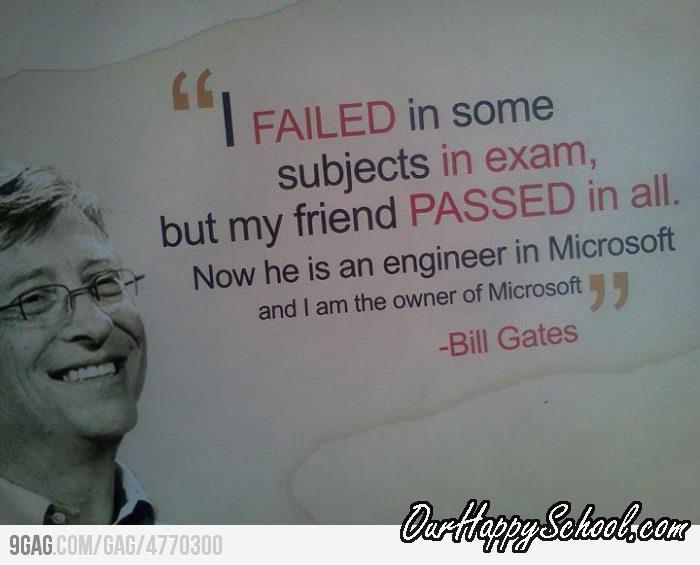Sponsored Links
Is measuring student’s performance a way of determining success?
 Are measuring instrument really an effective way of evaluating student's performance?Is this a valid criteria of identifying one's success?
Are measuring instrument really an effective way of evaluating student's performance?Is this a valid criteria of identifying one's success?
What is Measurement and Evaluation?
Measurement and Evaluation are integral part of any educational system. Generally, they are sought of as processes by which students are given examinations and then given school marks or grades on the basis of what they obtain in the examinations. Measurement and evaluation, however, are complicated processes and to have a better understanding of the terms they have to be further clarified.
MEASUREMENT
It is the process of determining the quantity of achievement of learners by means of appropriate measuring instruments
It is a systematic procedure of determining the quantity or extent of all the measurable dimensions in the educative process.
EVALUATION
It is the process of determining the quality or worth of achievement in terms of certain standards.
It is a systematic procedure of determining the quality of the results of measurement with the end in view of improving and maximizing the acquisition of desirable educational outcomes.
Instruments Used in Measurement
Examination– it is an appraisal of ability, achievement, or status in any respect. Examples: Preliminary Examination in Math 101
Test- it forces responses from a pupil and such responses are considered to be indicative of the pupil’s skills, knowledge, attitude, etc. Example: Test I. True or False, Test II. Multiple Choice, Test III. Essay.
Quiz– it is a relatively short test given periodically to measure achievement in material recently taught or on any small, newly completed unit of work. Example: Quiz on Mathematic (10-20 items only)
Item – is a part of test that elicits a specific response. Example: Multiple Choice questions, a true – false questions
Other measuring instruments
Term papers, Reaction papers, Projects, Themes, Experiments, Check lists, Rating scales, recitations
Results of Measurement
SCORE - is a number that indicates the quantity of achievement of an individual in a test and commonly determined in terms of items correctly answered.
Example: 15 out of 20 correct answers.
ACHIEVEMENT – is a level or measure of knowledge or proficiency of performance of a pupil or student in a subject taught in school.
Example: 90% or 1.5
Why Educational Measurement is difficult?
1.Many of the objects of measurement are highly abstract and hence, cannot be measured directly.
Example: To measure the knowledge of a student in Philippine History, he is given a test on the subject. The score that he obtains is only manifestation of his knowledge, not the result of direct measurement.
2.Many of the objects of measurement which are measured as distinct by themselves may actually refer to the same thing.
Example: Skills, ability, knowledge and talent are usually measured separately as distinct from one another but they may refer to the same item or if not, they overlap in meaning.
3.There is no zero point to start measurement from. Physical measurement has a zero point to start from, educational measurement has none.
Example: If knowledge is measured, there is no such thing as zero knowledge.
4.Most of the object of measurement are behaviors and are subject to change. Sometimes they occur, sometimes they do not.
Example: In one examination in a subject a student may study hard and he scores high but in the next examination he losses interest in studying hard and he scores low.
5.An object of measurement may be measured differently by different persons and for different purposes. This causes confusion.
Example: Reading ability may be measured differently, by different purpose, and by different persons.
6.There is a lack or scarcity of measuring instruments that give accurate measurement. There are places where tests that are not suitable for the culture of the place are being used.
Example: Old test may not be serving its purpose now but it still being used.
7.Environmental factors affect the student’s ability to assimilate and also affect their ability to score in a test.
Example: Poor Facilities
8.The human element are also important. Generally, different teachers (measurers) have different standards of excellence.
Example: Biases, temperament, health.
9.The health of the measured also affects measurement.
Example: Health condition
10.Cheating adversely affects accurate measurement.
Example: If a student cheats in an examination and as a result obtains a high score, his score is not a true measure of his knowledge of the subject matter of the examination.
11.Absences also affect measurement.
Purpose of Measurement to Students
1.Grouping of students into classes or sections based on ability for instructional purposes to produce. This is to produce homogeneity.
2.Tests are used to discover the extremely bright and talented students.
3.For purposes of granting scholarships, some institutions give competitive examinations for the purpose of selecting recipients of such scholarships.
4.For granting honors, the result of the measurement serve as basis for the selection of honor students.
5.Tests are given for emotional, educational, and vocational guidance and counseling purposes.
What’s your opinion:
Are results of examination sufficient means to determine the ability of students? Do you believe that testing students ability solely through examinations? Are results of examination a fair way to represent each student true capabilities?Are result of examinations reflects to the performance of teachers?
About the Author:
Rebecca Mauhay Nunesca is a Professional Industrial Engineer, and an ASEAN Engineer currently connected at Batangas State University as Faculty Staff in IE department. She is presently enrolled at Rizal Technological University taking MS Engineering Education, major in Industrial Engineering.
References:
Calderon, Jose F., and Expectacion C. Gonzales. Measurement and Evaluation. Mandaluyong City Philippines. National Bookstore, Inc. 1993
http://books.google.com.au/books?id=uizXxsteQ80C&pg=PA200&lpg=PA200&dq=m...





Comments
Rebecca M. Nunesca
Thu, 03/06/2014 - 11:07
Permalink
;)
Add new comment